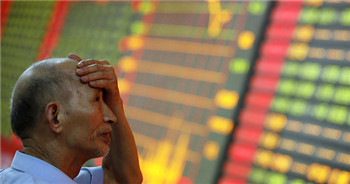(单词翻译:单击)

In the wake of the Chinese stock market’s dramatic fall early this month, police and securities regulators announced they had launched an investigation into “malicious short selling” in the equity futures market.
中国股市本月初出现戏剧性下跌后,警方和证券监管机构宣布,他们对股指期货市场的“恶意卖空”展开了调查。
The announcement was part of a raft of measures intended to stabilise the market after it fell 30 per cent from its peak in mid-June, but it also raised the question: what makes short selling “malicious”?
这一宣布是一揽子措施的一部分,目的是在股市从6月中旬触及的高点下滑30%后稳住市场,但它也带出了一个问题:哪些卖空行为属于“恶意”?
The lurid terminology, coupled with a lack of detail on what behaviour is being targeted, has led critics to suspect that the investigation is an extralegal attempt to intimidate would-be sellers. But lawyers say that bearish bets can be illegal if they are based on inside information or made with the intent to influence prices.
耸人听闻的术语,加上对于哪些行为属于打击目标语焉不详,导致批评者怀疑这项调查是恐吓潜在卖家的法外企图。但律师们表示,看跌押注如果基于内部信息或者意在影响价格,确实有可能触犯法律。
“Short selling itself is neutral market behaviour and not a crime. But if it involves market manipulation, insider trading or false statements, then it becomes illegal as a violation of either securities law or criminal law,” said Liu Junhai, professor at Renmin University law school in Beijing.
“卖空本身是中性的市场行为,不构成犯罪。但是,如果它涉及市场操纵,内幕交易或虚假陈述,那么它就构成非法行为,违反了证券法或者刑法”,中国人民大学法学院教授刘俊海表示。
Meng Qingfeng, vice-minister of public security, said last week that police had found evidence of “manipulation of securities futures”. The China Securities Regulatory Commission, the securities regulator, also said “market manipulation” is part of its definition of malice.
公安部副部长孟庆丰上周表示,警方已经找到了“操纵证券期货”的犯罪线索。中国证券监督管理委员会(CSRC)也表示,“市场操纵”是其对“恶意”定义的一部分。
Classic stock market manipulation involves “pump-and-dump” schemes in which a group of investors colludes to bid up the price of a single stock, then sells it before the price crashes. Similar tactics can be used to temporarily pressure a stock’s price downward.
经典的股市操纵手法涉及“炒高再抛售”伎俩,一群投资者串通哄抬某一只个股的价格,然后在价格崩溃之前抛掉它。类似的战术可用来打压一只股票的价格。
Yet such tactics would appear difficult to execute in China’s large and highly liquid index futures market. Turnover on futures pegged to the CSI 300 index totalled Rmb756bn ($122bn) on July 1, the day before the regulator announced its probe of short sellers. The CSI 300 tracks the largest companies listed in Shanghai and Shenzhen, so manipulating the underlying index would also seem to be challenging.
然而,这种战术似乎很难在中国庞大且流动性很高的股指期货市场执行。在监管机构宣布调查卖空者的前一天,即7月1日,追踪沪深300指数(CSI 300 index)的期货的成交量达到7560亿元人民币(合1220亿美元)。沪深300指数跟踪在上海和深圳上市的大盘股,因此操纵标的指数似乎也是不容易的。
But some experts say the large role of margin finance in the market means that manipulating prices would not be as difficult as sceptics believe. In order to ensure that margin loans can be repaid, brokerages and grey-market margin lenders set stop-loss thresholds that trigger automatic selling of shares when the price drops below a certain level. If a short seller knew of a key index level below which a big wave of forced selling would be unleashed, he could exploit this knowledge, said Yan Yiming, an attorney specialising in securities law.
但一些专家表示,保证金融资在市场中的巨大作用意味着,操纵价格的难度不像怀疑论者所相信的那么大。为了确保保证金贷款得到偿还,券商和灰色市场保证金放贷机构会设定止损门槛,当价格低于某个关口时,此类门槛会触发股票的自动抛盘。专长于证券法的律师严义明介绍说,如果一个卖空者知道,股指低于某个关键水平将引发一波被迫抛售的浪潮,他就可以利用这一信息牟利。
“You pressure the index down a little bit, and that forces liquidation worth billions more. It wouldn’t take that much money,” said Mr Yan, who represented the former head of Everbright Securities’ high-frequency trading unit last year in a highly publicised insider trading case stemming from a computer glitch.
“你把指数压低一点点,就会迫使额外的巨额变现。这种操作需要的资金并不那么多,”严义明表示。他曾在去年一起发端于一个电脑故障的令人瞩目的内幕交易案中,代表股民起诉光大证券(Everbright Securities)。
Asked for a definition of “malicious short selling” at this month, Deng Ge, CSRC spokesman, said it was “cross-market or cross-maturity manipulation”. This explanation suggests authorities are focused on investors who placed bearish bets in both the futures and cash equities markets. A short seller hoping to profit from bearish bets in the futures market could try to manipulate the linked index downward to make his futures contracts pay off.
在被问及本月“恶意卖空”行为的定义时,中国证监会新闻发言人邓舸表示,“跨市场和跨期现市场操纵就是恶意做空”。这个解释似乎表明,当局正聚焦于在期货和现货股市都进行看跌押注的投资者。希望获利于期货市场看跌押注的卖空者,可能试图向下操纵挂钩的股指,使他的期货合约有利可图。
Liu Yuhui, researcher at the Institute of Finance and Banking at the Chinese Academy of Social Sciences, a think-tank that advises the government, said regulators may be probing a surge of activity on futures linked to the CSI 500 index, which tracks a group of smaller companies.
向政府提供咨询的智库——中国社科院金融研究所的研究员刘煜辉表示,监管部门或许在调查与沪深500指数(CSI 500 index)——跟踪中小企业——挂钩的期货交易活动激增的情况。
The launch of CSI 500 futures in April gave Chinese investors an approved tool for placing bearish bets on small and mid-cap stocks for the first time. Meanwhile, smaller shares were rising even faster than blue-chips during the broader share rally. Daily turnover on CSI 500 futures averaged a modest Rmb422m in May but suddenly surged to Rmb934bn on June 19 when the index began to plunge.
今年4月推出的沪深500指数期货,使中国投资者首次拥有对中小盘股进行看跌押注的官方批准的工具。与此同时,在股市整体上涨的背景下,中小盘股比大盘蓝筹股涨得更快。5月份,沪深500指数期货的日均交易量为4.22亿元人民币,不算高,但在6月19日,即股指开始大幅下挫的那一天,突然飙升至9340亿元人民币。
“We really did see some abnormal phenomena, this is undeniable. It was concentrated dumping in both the cash and futures markets, smashing the market,” said Mr Liu. Yet this, too, could be explained as a legitimate market response to panic selling. With the price of small-caps tumbling, it is natural that futures market activity would increase as investors rushed to hedge their exposures — or profit from the slide. It remains to be seen whether authorities will punish investors for
“我们确实看到了一些不正常的现象,这是不可否认的。那就是在现货和期货市场同时集中抛售,压垮市场,”刘煜辉表示。然而,这也可以被解释为恐慌性抛售引发的正当市场反应。随着小盘股的价格暴跌,期货市场活动增加是自然的,因为投资者会竞相对冲自己的敞口——或者获利于大盘下挫。尚不清楚当局会否针对具体交易惩罚投资者。不管怎样,刘煜辉预计卖空规则将被收紧。


